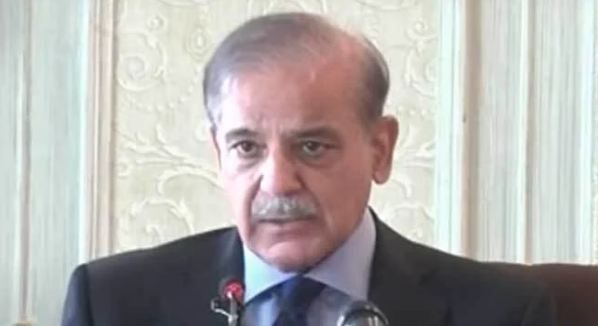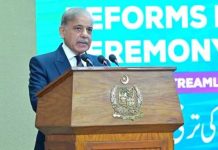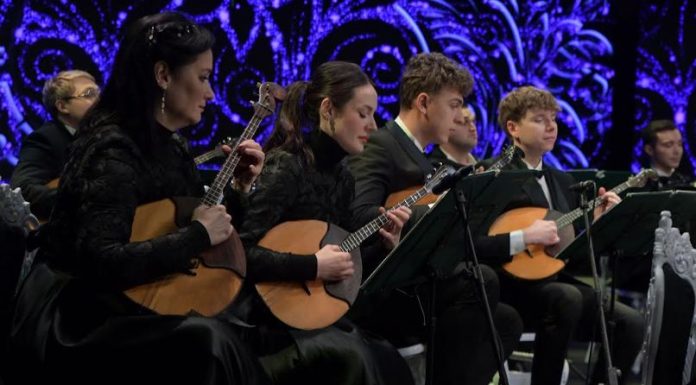LAHORE/ISLAMABAD: Prime Minister Shehbaz Sharif said Wednesday that a parliamentary committee would discuss the terms of talks between the ruling alliance and the Pakistan Tehreek-e-Insaf (PTI) regarding holding elections across the country on the same day.
He made the comments in a meeting with leaders of the 13 parties — known as the Pakistan Democratic Movement (PDM) — that form the coalition government.
The meeting comes a day before a hearing of the Supreme Court on petitions requesting single-day elections to the national and provincial assemblies. In the previous hearing, the apex court had directed the government and opposition parties to reach a consensus on the date for holding elections.
In his address today, the premier said the parliament had dealt with challenges in the past and taken constitutional and legal steps regarding the Supreme Court.
The situation was still challenging, he continued. Referring to the verdict of a three-member Supreme Court bench that ordered polls to the Punjab Assembly on May 14, he said the parliament did not accept the bench.
Pakistan Democratic Movement (PDM) chief Maulana Fazlur, Pakistan Peoples Party (PPP) Co-Chairman Asif Ali Zardari, Muttahida Qaumi Movement-Pakistan (MQM-P) Khalid Maqbool Siddiqui and other leaders attended the meeting held earlier today.
Attorney General for Pakistan Mansoor Usman Awan and federal ministers also attended the meeting.
As per sources, the meeting was briefed by the legal team on the election fund case and the negotiations with PTI.
Earlier today, The News had reported that there are chances of Pakistan Muslim League-Nawaz (PML-N) supermo Nawaz Sharif — who is currently in Saudi Arabia — attending the meeting virtually.
During the last meeting of the coalition partners, PPP Chairman Bilawal Bhutto Zardari suggested dialogue with the PTI but the PDM chief Fazl outright rejected the proposal.
PMLN sources claim that the party leadership has asked Ayaz Sadiq to contact PTI’s Asad Qaiser and both have agreed to meet today. However, PTI chief Imran Khan has clearly stated that the mandate for negotiations rests with Shah Mahmood Qureshi.
On April 20, the top court adjourned the hearing of the petition till April 27 after the key ruling parties —PPP and PML-N — had assured the Supreme Court they would sit with the PTI on April 26 and try to find a solution on the election date.
A three-member bench of the top court — headed by Chief Justice Umar Ata Bandial and comprising Justice Ijazul Ahsan and Justice Munib Akhtar — has sought a progress report on the talks by April 27.
‘Disagreement’ among ruling allies
A dispute emerged among the ruling parties over holding talks with the PTI on April 18, sources told Geo News, after Jamaat-e-Islami’s (JI) bid to bring both sides to the negotiation table.
The PDM coalition partners met in Islamabad after PM Shehbaz convened a meeting on the country’s political situation and the JI’s negotiation efforts.
During the meeting, a disagreement took place among the parties in the coalition government over holding talks with the opposition party as some believed that PTI Chairman Imran Khan could not be trusted, while others insisted that political forces should not shut channels for negotiations.
PPP Chairman Bilawal had stressed holding dialogue with the opposition, with Muttahida Qaumi Movement-Pakistan (MQM-P), Balochistan National Party, Balochistan Awami Party, Chaudhry Salik, and Mohsin Dawar backing him, sources said.
Bilawal said closing the door for talks is against his party’s principles and “undemocratic”.
But representatives of the Jamiat Ulema-e-Islam-Fazl (JUI-F) and the Jamhoori Wattan Party (JWP) rejected Bilawal’s opinion and said that it isn’t in the coalition’s interests to hold talks with the deposed prime minister — who was ousted from the office via a no-confidence vote in the National Assembly in April last year.
Later, the PPP supremo also held a separate meeting with the JUI-F chief to convince him.
Following the SC directives, both Bilawal and Fazl rejected the order, terming the dialogue between political parties as directed by the court “talks at gunpoint”.












